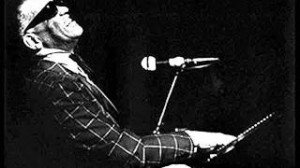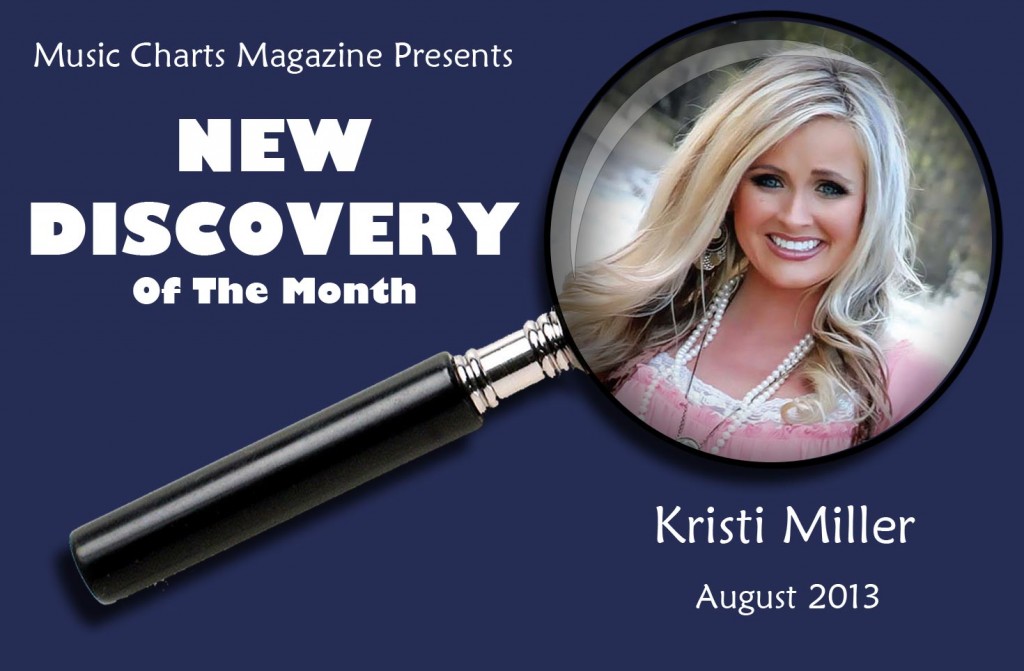Monthly Archives: August 2013
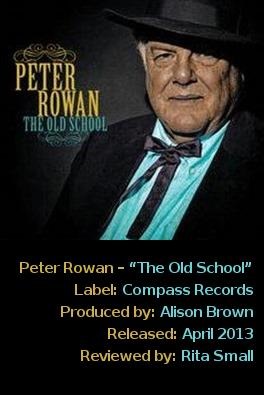 It is 2 AM and something draws me from bed and compels me to begin writing this review. Not in the usual way, no laptop, no touchpad, all I need is a notebook and a pen. I know, sometimes the old school way is just better.
It is 2 AM and something draws me from bed and compels me to begin writing this review. Not in the usual way, no laptop, no touchpad, all I need is a notebook and a pen. I know, sometimes the old school way is just better.
Nevertheless, why does this assignment need to be handled in this manner? Has the project I have been listening to for the past weeks rubbed off on me? Or, as I suspect, will paper and pen make it easier to follow my ramblings through the inevitable editing process necessary when the time comes to finally convey my thoughts to the laptop about this simple yet profoundly complex project that Peter Rowan has compiled.
“The Old School” is a wonderfully entertaining project in which Mr. Rowan gives listeners ten original songs, one traditional song with his personalized stellar arrangement, and for those purchasing the CD, a bonus track…a reprise of the title cut, featuring Eddie Stubbs.
For this project, Rowan and producer Alison Brown, have brought together artists that, aside from being a Who’s Who of Bluegrass’ Old School in their own right, have paved the way for, and continue to be, the inspiration for many Bluegrass artists today.
In the opening song, and title track, Rowan gives us the two simple rules of The Old School: pick it clean and play it true. These two rules set the tone for the remainder of the project. Listeners will be hard-pressed to find anyone straying from these rules. Another testament to the talent of Rowan’s songwriting ability is that you can picture Rowan and his fellow artists living the things he writes about in this track. Experiencing life and paying their dues in those formative years of the music that we all hold so dear.
These two rules are what create the simple and yet complex undertones of this project. Upon first hearing a song, one thinks Rowan has written a nice quaint melody. Then the song beckons you to listen again and you hear the subtle chord or the lyric that catches your attention and begs to be heard again. In an industry where song selection is so vital, Rowan proves through his choice of putting these songs into “The Old School” that he is the Head Master.
While every song on this project made me smile, perhaps none more so, than Rowan’s touching and heartfelt tribute, “Doc Watson Morning”…
To read the complete review please click HERE:
Music Charts Magazine Bluegrass Artist and Album Reviews ( by Prescription Bluegrass – YOUR Bluegrass Music Source )
Listen to Ray Charles’s song “Georgia On My Mind” here:
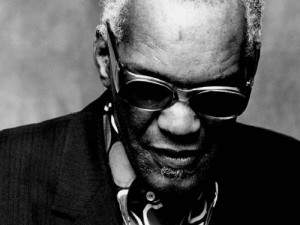 Ray Charles Robinson (September 23, 1930 – June 10, 2004) was an American singer-songwriter and composer known as Ray Charles. He was a pioneer in the genre of soul music during the 1950s by fusing rhythm and blues, gospel, and blues styles into his early recordings with Atlantic Records.He also helped racially integrate country and pop music during the 1960s with his crossover success on ABC Records, most notably with his Modern Sounds albums. While with ABC, Charles became one of the first African-American musicians to be given artistic control by a mainstream record company. Frank Sinatra called Charles “the only true genius in show business,” although Charles downplayed this notion.
Ray Charles Robinson (September 23, 1930 – June 10, 2004) was an American singer-songwriter and composer known as Ray Charles. He was a pioneer in the genre of soul music during the 1950s by fusing rhythm and blues, gospel, and blues styles into his early recordings with Atlantic Records.He also helped racially integrate country and pop music during the 1960s with his crossover success on ABC Records, most notably with his Modern Sounds albums. While with ABC, Charles became one of the first African-American musicians to be given artistic control by a mainstream record company. Frank Sinatra called Charles “the only true genius in show business,” although Charles downplayed this notion.
The influences upon his music were mainly jazz, blues, rhythm and blues and country artists of the day such as Art Tatum, Nat King Cole, Louis Jordan, Charles Brown, and Louis Armstrong. His playing reflected influences from country blues, barrelhouse and stride piano styles.
Rolling Stone ranked Charles number ten on their list of “100 Greatest Artists of All Time” in 2004, and number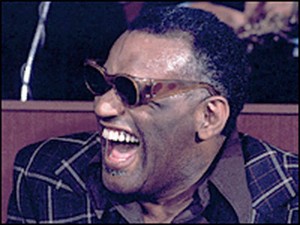 two on their November 2008 list of “100 Greatest Singers of All Time”. In honoring Charles, Billy Joel noted: “This may sound like sacrilege, but I think Ray Charles was more important than Elvis Presley.
two on their November 2008 list of “100 Greatest Singers of All Time”. In honoring Charles, Billy Joel noted: “This may sound like sacrilege, but I think Ray Charles was more important than Elvis Presley.
On March 15, 1961, not long after releasing the hit song “Georgia on My Mind” (1960), Charles (born in Albany, Georgia) was scheduled to perform for a dance at Bell Auditorium in Augusta, Georgia. However, he cancelled after learning from students of Paine College that the larger auditorium dance floor would be restricted to whites, while blacks would be obligated to sit in the Music Hall balcony; he immediately left town after letting the public know why he wouldn’t be performing. The promoter sued Charles for breach of contract, Charles was fined $757 in Fulton County Superior Court in Atlanta on June 14, 1962 and, according to the biopic Ray (2004), Charles was banned from performing thereafter in Georgia, although this later was reported to be a Hollywood embellishment—Charles was, in fact, never banned from Georgia. However, Charles performed again at a desegregrated Bell Auditorium concert the following year with his backup group, The Raelettes, on October 23, 1963.
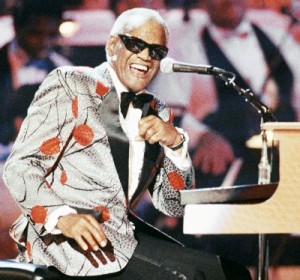 In 1979, Charles was one of the first of the Georgia State Music Hall of Fame to be recognized as a musician born in the state. Ray’s version of “Georgia On My Mind” was made the official state song for Georgia.
In 1979, Charles was one of the first of the Georgia State Music Hall of Fame to be recognized as a musician born in the state. Ray’s version of “Georgia On My Mind” was made the official state song for Georgia.
On December 7, 2007, Ray Charles Plaza was opened in Albany, Georgia, with a revolving, lighted bronze sculpture of Charles seated at a piano.
Ray Charles Robinson was the son of Aretha (Williams) Robinson, a sharecropper, and Bailey Robinson, a railroad repair man, mechanic and handyman. Aretha was a devout Christian and the family attended the New Shiloh Baptist Church. When Ray was an infant, his family moved from Albany, Georgia, where he was born, to the poor black community on the western side of Greenville, Florida. In his early years, Charles showed a curiosity for mechanical things and he often watched the neighborhood men working on their cars and farm machinery. His musical curiosity was sparked at Mr. Wiley Pit’s Red Wing Cafe when Pit played boogie woogie on an old upright piano. Pit would care for George, Ray’s brother, so as to take the burden off Aretha. However, George drowned in Aretha’s laundry tub when he was four years old. After witnessing the death of his brother, Ray would feel an overwhelming sense of guilt later on in life.
Charles started to lose his sight at the age of five and went completely blind by the age of seven, apparently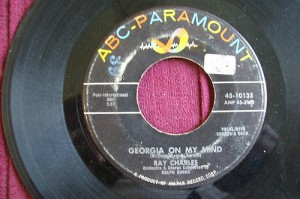 due to glaucoma. He attended school at the Florida School for the Deaf and the Blind in St. Augustine from 1937 to 1945, where he developed his musical talent. During this time he performed on WFOY radio in St. Augustine. His father died when he was 10, his mother five years later.
due to glaucoma. He attended school at the Florida School for the Deaf and the Blind in St. Augustine from 1937 to 1945, where he developed his musical talent. During this time he performed on WFOY radio in St. Augustine. His father died when he was 10, his mother five years later.
Charles played chess using a special board with holes for the pieces and raised squares. Charles referred to Willie Nelson as “my chess partner” in a 1991 concert. In 2002, he played and lost to American Grandmaster and former U.S. Champion Larry Evans.
His final album, Genius Loves Company, released two months after his death, consists of duets with various admirers and contemporaries: B.B. King, Van Morrison, Willie Nelson, James Taylor, Gladys Knight, Michael McDonald, Natalie Cole, Elton John, Bonnie Raitt, Diana Krall, Norah Jones, and Johnny Mathis. The album won eight Grammy Awards, including 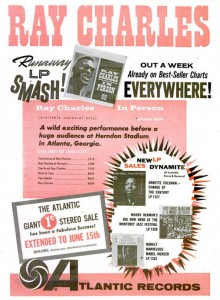 five for Ray Charles for Best Pop Vocal Album, Album of the Year, Record of the Year and Best Pop Collaboration with Vocals for “Here We Go Again” with Norah Jones, and Best Gospel Performance for “Heaven Help Us All” with Gladys Knight; he also received nods for his duets with Elton John and B.B. King. The album included a version of Harold Arlen’s “Over the Rainbow”, sung as a duet by Charles and Johnny Mathis; this record was played at his memorial service.
five for Ray Charles for Best Pop Vocal Album, Album of the Year, Record of the Year and Best Pop Collaboration with Vocals for “Here We Go Again” with Norah Jones, and Best Gospel Performance for “Heaven Help Us All” with Gladys Knight; he also received nods for his duets with Elton John and B.B. King. The album included a version of Harold Arlen’s “Over the Rainbow”, sung as a duet by Charles and Johnny Mathis; this record was played at his memorial service.
Two more posthumous albums, Genius & Friends (2005) and Ray Sings, Basie Swings (2006), were released. Genius & Friends consisted of duets recorded from 1997 to 2005 with his choice of artists. Ray Sings, Basie Swings consists of archived vocals of Ray Charles from live mid-1970s performances added to new instrumental tracks specially recorded by the contemporary Count Basie Orchestra and other musicians. Charles’s vocals recorded from the concert mixing board were added to new accompaniments to create a “fantasy concert” recording.
released. Genius & Friends consisted of duets recorded from 1997 to 2005 with his choice of artists. Ray Sings, Basie Swings consists of archived vocals of Ray Charles from live mid-1970s performances added to new instrumental tracks specially recorded by the contemporary Count Basie Orchestra and other musicians. Charles’s vocals recorded from the concert mixing board were added to new accompaniments to create a “fantasy concert” recording.
Read more at: http://en.wikipedia.org/wiki/Ray_Charles
Music Charts Magazine Presents – “NEW DISCOVERY” – “Kristi Miller” – for the month of August 2013.
Looking for some “New” music to add to your player and can’t find anything that blows you away?
Check out this Music Charts Magazine “NEW DISCOVERY” Interview with “Kristi Miller” and be prepared to be excited knowing there is still 100% awesome music out there that you still have not heard.
After you listen to this great interview showing you the ins and outs of Kristi Miller ( a girl that hails from the Great State of Kentucky ), we are sure you will be glad you found this “New Discovery” to add to your music playlist.
For booking, interviews, or just to say Hi! Contact Kristi Miller at her website: www.KristiMiller.net
Music Charts Magazine proudly presents “NEW DISCOVERY” for the month of August 2013 “Kristi Miller“
LISTEN To “NEW DISCOVERY” Interview with Kristi Miller HERE:
Music Charts Magazine Present “New Discovery” Kristi Miller – Interview by Big Al Weekley
Copyright © 2012 – 2013 Music Charts Magazine, INC – All Rights Reserved. Contents of this site including text and media may not be reproduced without prior written consent. Audio and video elements of this site are property of their respective owners and are used with permission.
